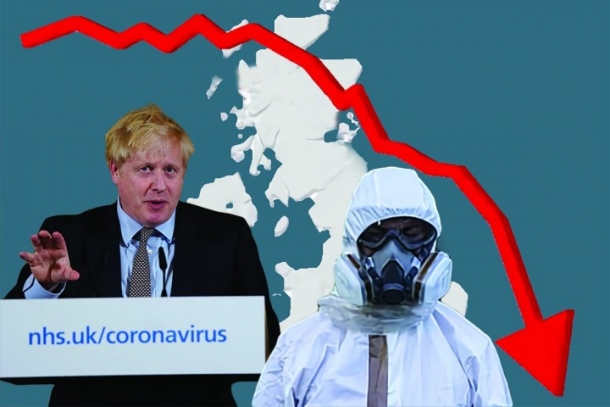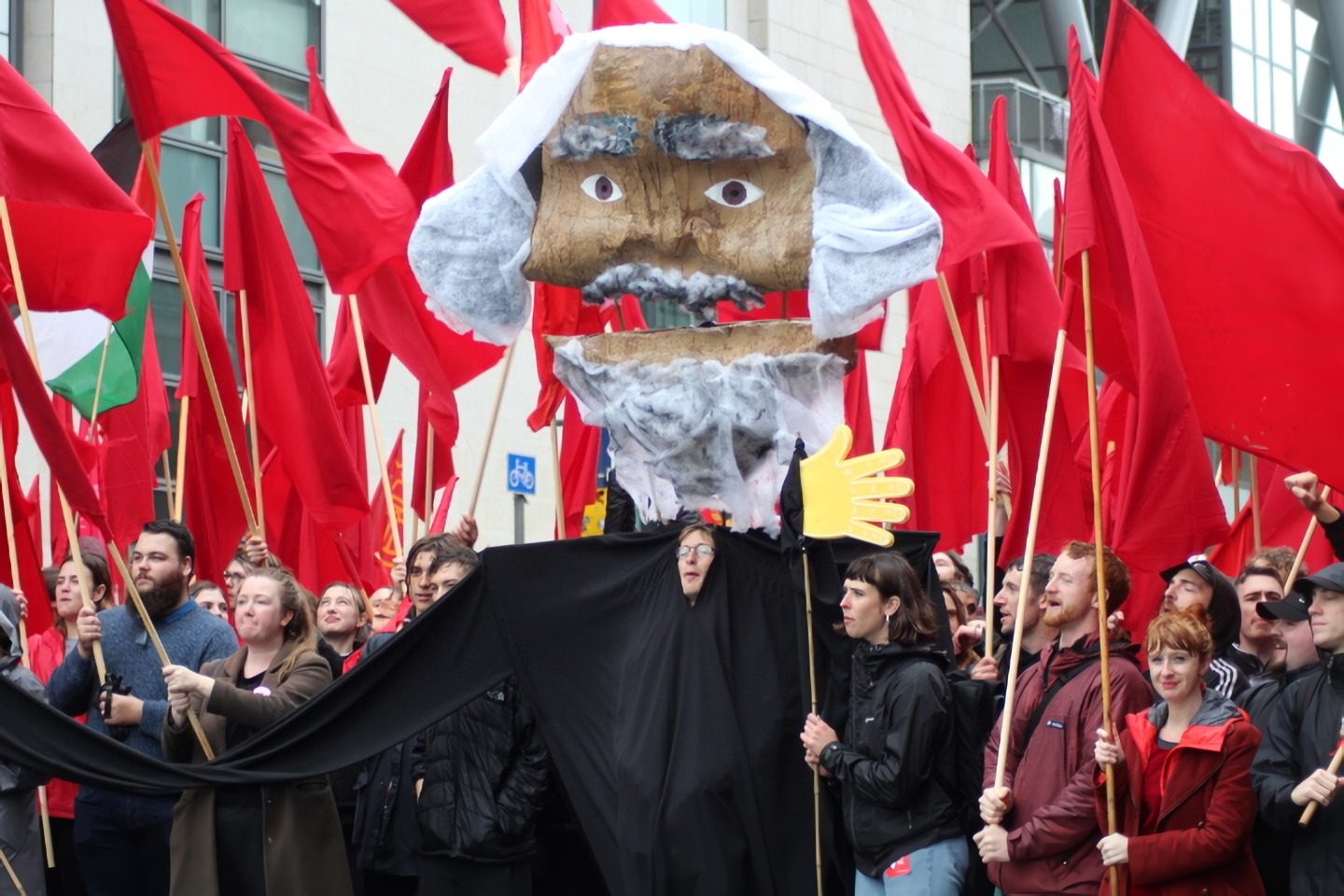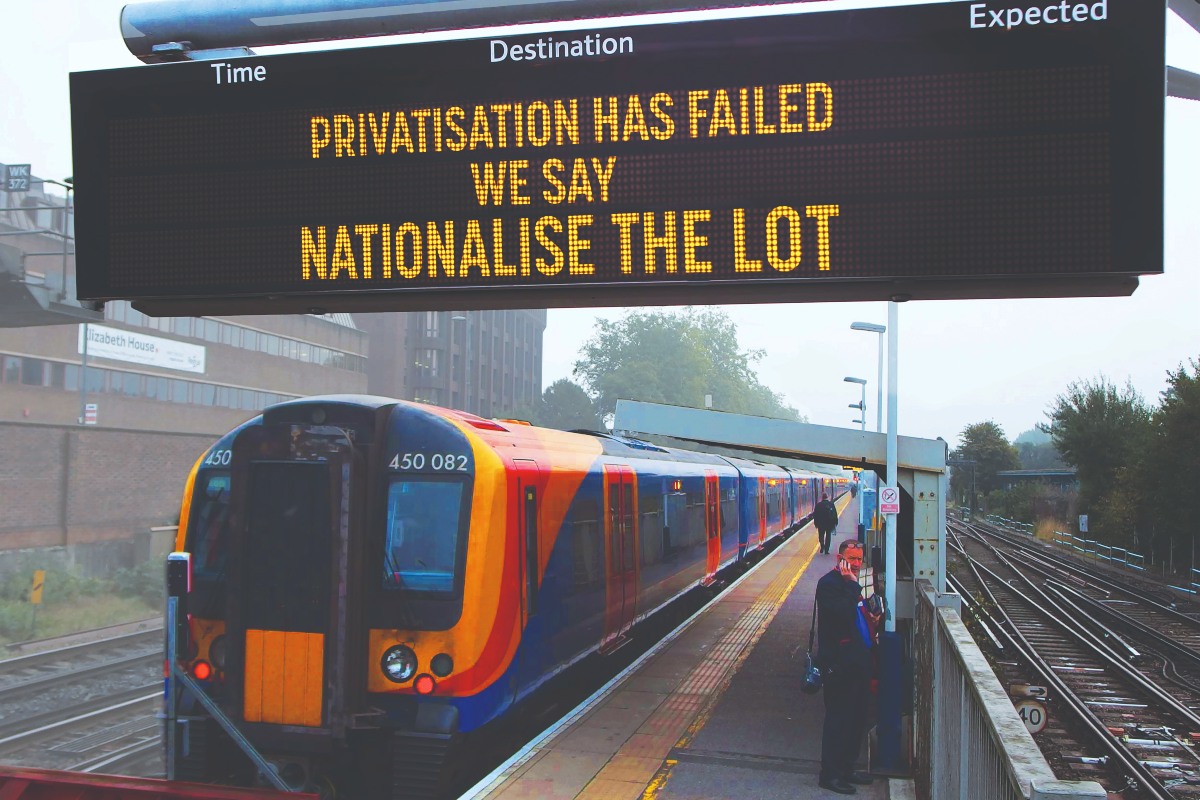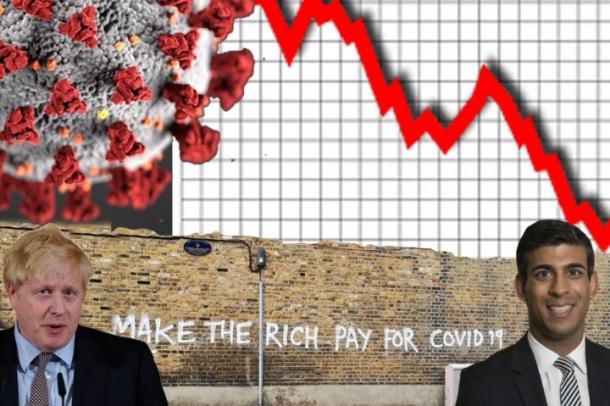The Chancellor’s recent pledge for the state to cover workers’ wages shows the desperate situation facing the ruling class. The labour movement leaders must go further and demand nationalisation and democratic economic control.
Within weeks of becoming Chancellor of the Exchequer, Rishi Sunak has made history by unveiling the government’s ‘coronavirus job retention scheme’.
The Chancellor’s fiscal support package is the first time ever that the government has stepped in to pay the wages of private sector workers. It represents an unprecedented level of state intervention in the economy.
This demonstrates both the depth of the crisis facing capitalism, and also the desperation of the ruling class to save their system at any cost.
Tories turning into socialists?
What exactly has been put forward by the Chancellor? The headline measure is that workers who would otherwise have been made redundant by the pandemic-induced economic paralysis will receive 80% of their wages, up to a value of £2,500 per month, paid directly through HMRC.
At the time of writing, Sunak has not stated what the total cost of this latest package will be. Nevertheless, what is being proposed is staggering – especially coming from a Tory government. As Nick Cohen wrote recently in Conservative journal The Spectator:
“Conservatives are turning into socialists. The government announces vast state interventions by the hour. Left–wing campaigners find themselves in a new world. They assumed five years of a Conservative administration with a strong majority guaranteed that pretty much everything they said would be ignored. Now what they suggest one day the government adopts the next. It is as if they are in Downing Street.”
The Financial Times has calculated that the Chancellor’s recent announcement would bring the government’s total expenditure on ‘coronavirus related’ packages to a minimum of £43 billion. But this estimate accounts for only 12 weeks of wages being covered by the state. And it assumes that only approximately one million workers will require this additional financial support. Precarious workers and the self–employed, meanwhile, have been left high-and-dry.
For comparison: the hospitality sector alone employs around three million workers; and Unite the Union estimates that at least one-third of these jobs will go as a result of the closure of pubs, clubs, restaurants, etc..
Furthermore, the estimate does not include the tax income that will be lost due to tax reliefs, and due to the falling revenues made inevitable by the deep recession that the economy is plunging into.
Only the beginning
The crisis is deepening at a terrifying pace. Since this year’s Budget was announced – only two weeks ago – the government is now looking to borrow a further £100 billion on top of what was originally intended.
But this is only the beginning. As the economy continues its freefall and events spiral out of control, the government will be forced to throw even more money at the problem. After all, the problem is not simply one of cash (‘liquidity’) and falling demand. The whole global capitalist system is in meltdown.
 At the end of the day, the Tories’ aim is not to support workers, but to save the capitalist system / Image: Socialist Appeal
At the end of the day, the Tories’ aim is not to support workers, but to save the capitalist system / Image: Socialist Appeal
Total government expenditure for this crisis is already set to far outstrip that of Gordon Brown’s stimulus package and bailout of the banks in the wake of the 2008–09 slump. And this current crisis is going to be much worse than that. Sunak’s wage subsidy pledge should be understood with this historical parallel in mind.
Despite the lavish praise being heaped on his shoulders, the Chancellor’s policy is nothing unique. Internationally – and across governments of different stripes and colours – the ruling class’ general policy on this question is becoming unanimous.
Nor, we must add, does it come from any sense of generosity. After all, where is the money for self–employed workers, who will now be forced to survive on the meagre £94 per week provided by statutory sick pay?
At the end of the day, the Tories’ aim is not to support workers, but to save the capitalist system. The real multi–billion dollar question is: Who will pay? Who will be presented with the bill once the epidemic is behind us?
Who pays?
The Tory government is not bailing out the working class or the general public. Rather, as the Financial Times accurately summarises, it is stepping in “to effectively nationalise a substantial part of the country’s private sector wage bill.”
Once again we see how, when the market economy fails, the bosses keep their profits, while the debts are handed over to the public sector. As Karl Marx remarked inCapital: “The only part of the so-called national wealth that actually enters into the collective possessions of modern peoples is their national debt.”
We are told time after time by the defenders of capitalism that the money does not exist to house the homeless or feed the hungry. Reducing the deficit is an economic necessity, the Tories constantly remind us, as they sarcastly assert that ‘there is no magic money tree’.
Yet when times are tough for the capitalist class, the state steps in without hesitation and takes the hit.
But, of course, it is workers who will be forced to pay down the line. What is given with one hand by the Tories today (out of desperation), will be demanded back – with interest – in the future. After all, there is no such thing as a free lunch under capitalism.
It is now 12 years since the 2008 crash, when the banks and big business were bailed out by the public purse. All that workers have known since then is austerity.
Under capitalism, it is the working class who will always be made to pay: through attacks on pensions and rising retirement ages; through cuts to wages, sick pay, holidays, and maternity leave; through an assault on working conditions, and an ever-increasing intensity of work; and, of course, through cuts to public services, social support, and healthcare.
The working class have already paid dearly for the 2008 crisis. And it is precisely the last decade of austerity that has left our healthcare system, local government, and national infrastructure completely ill-equipped and unprepared for this epidemic now facing society.
Appetite comes with eating
As Marx noted in the pages of the Communist Manifesto: “The executive of the modern state is nothing but a committee for managing the common affairs of the whole bourgeoisie.”
This is demonstrated clearly by the Tories’ enormous wage subsidy package. The Tory government is simply managing the general interests of the capitalist class – making the working class pay for this new crisis, but in a more protracted manner, in order to minimise social backlash and preserve the capitalist system as a whole.
 The current crisis will leave an indelible impression on the consciousness of the working class / Image: Socialist Appeal
The current crisis will leave an indelible impression on the consciousness of the working class / Image: Socialist Appeal
When the immediate threat of collapse and social revolt die down, we will be told once again that it is time to tighten our belt; that the deficit must be reduced; and that the money simply is not there to support workers, the poor, and the vulnerable. Of course, we should expect nothing less from the Tory Party, who are masters in the art of hypocrisy.
But attempts to reverse these measures in the future will not be so easy. As the old saying goes, appetite comes with eating. The current crisis – and the government’s drastic response – is eroding any remaining faith in the market; undermining the previously sacrosanct position of profit and private property. And this will leave an indelible impression on the consciousness of the working class.
The more astute bourgeois commentators can already see the long-term dangers that lie ahead. As the Economist magazine concluded:
“Some measures may prove hard to unwind. A better deal for self–employed workers, renters and benefit claimants could be popular. Nationalised transport companies may prove efficient, or hard to sell.
“The drive to downsize the state was born of the belief that the market is a more efficient decision–maker. Pandemics challenge this. ‘If the government takes huge powers and doesn’t obviously cock it up, people come to accept the higher and more intrusive exercise of state powers as a norm,’ says Lord Sumption...
“The government of Clement Attlee, Winston Churchill’s successor, offers an analogy: Attlee redirected the wartime state to establishing free health care, public housing and state ownership of industry. Covid–19 will combine urgent mobilisation with a collective experience of pain, the breaking of economic taboos and the midwifing of once–radical ideas, argues Peter Hennessy, a constitutional historian.”
Wages vs Profits
The Labour and trade union leaders must fight to make the bosses pay for this crisis. The slogan should be the same as that of the labour movement in relation to the scourge of mass unemployment in the Great Depression: work or full pay!
Thus far, however, the leaders of the labour movement have only called for vast government spending – calls that have now been delivered by the Tory Party, for their own cynical reasons and interests.
Jeremy Corbyn, John McDonnell, and Labour leadership hopeful Rebecca Long–Bailey are correct to demand that workers’ incomes be guaranteed, as well as for mass investment into welfare and particularly healthcare. But Labour should go further and campaign for clear socialist policies.
The Party’s recent policy document on Wages, Welfare and Wellbeing states: “This is a scheme tailored to the needs of workers and businesses.”
Similar statements have been made by Frances O’Grady, general secretary of the TUC, who tweeted that: “As well as providing emergency support to business, it is essential that money goes into workers' pockets now. We must do whatever it takes to stop businesses going to the wall and workers being plunged into poverty.”
But the interests of workers and big business are fundamentally opposed. The profits of the latter, after all, are based on the unpaid labour of the working class. And in the final analysis, the costs of this crisis must either be borne by the workers or the capitalists.
We say, it is the capitalist class who must pay for this crisis. The wealth exists in society to put non-essential production on hold, whilst still paying workers – all workers – a full wage. Corporations in the UK are sitting on over £700 billion of idle, uninvested cash reserves – money that the bosses cannot find a profitable use for. This, not government borrowing and debt, is where the money should come from to pay for wages.
Nationalisation and planning
Instead of worrying about the profits of big business, the TUC – which represents over 6 million workers – should be calling for the expropriation of big business, to be run democratically by the workers themselves.
Beyond the question of wages and the precarity of work under capitalism, the coronavirus crisis has demonstrated the desperate need to reorient the economy to build hospitals and produce healthcare equipment, ventilators, medication, and much more. The anarchy and shortages in the supermarkets, meanwhile, also shows the need for a general plan of production.
 What we need is not just a ‘universal basic income’, but public ownership, economic planning, and democratic control / Image: Socialist Appeal
What we need is not just a ‘universal basic income’, but public ownership, economic planning, and democratic control / Image: Socialist Appeal
This raises the question of economic ownership and control. As socialists have consistently pointed out, you can’t plan what you don’t control; and you don’t control what you don’t own.
In short, what is required is not simply Keynesian spending, stimulus and bailouts, but nationalisation and socialist economic planning. On such a basis, all of society’s needs could be met overnight.
The call from the left and labour movement, in this respect, should not just be for an expansion of the welfare state, but for an economy based on needs. After all, during this crisis, rich landlords will carry on reaping in rip-off rents. Amidst the chaos and uncertainty, meanwhile, the big supermarket chains are already registering record profits.
What is required is wartime-style planning to provide necessities such as food and medicines, with major distributors brought under public ownership and control, as part of a general plan of production. Alongside this, we need the nationalisation of the banks, utility firms, and telecoms monopolies to ensure that households have access to water, electricity, and the internet through these troubled times.
In other words, what we need is not just a ‘universal basic income’, but public ownership, economic planning, and democratic control to take control out of the hands of the capitalists and landlords, and into the organised working class and society as a whole. This should be the clarion call of the labour movement at this time.
Socialism or barbarism
Sooner or later, the illusions in the government’s apparent generosity will fade away, exposing the brutal reality of capitalism in crisis. All the concessions made now will be stripped away at a later date. In an attempt to restore profitability, the capitalists will demand repayment of all the loans made, through cuts to wages, working conditions, and public services.
The working class will be forced to foot the bill – once again – as government spending today becomes further austerity tomorrow.
People’s lives have been turned upside down in recent days and weeks. This is only set to continue. In the process, consciousness will be transformed, as the working class are forced to confront and question every previously-held belief and assumption. No rock will go unturned.
Industrial workers, the backbone of the economy, will be made to work by the bosses, despite the risk to themselves and their families. Hundreds of thousands will be made redundant, despite the promises of government subsidies. The self-employed will be thrown down into the ranks of the working class and the unemployed. Doctors and nurses will demand public control of private facilities.
The ruling class will be hoping that they can return to business as usual when the immediate health crisis blows over. But this is a desperate dream. A period of intense class struggle is being prepared, which sooner or later will burst to the surface - with or without the permission of the trade union leaders.
The practical problems posed by this crisis point directly to socialist solutions. The labour movement must show the way forward. We must not simply patch up the holes in the capitalist system, but fight for a bold socialist alternative to the current chaos and barbarism.

